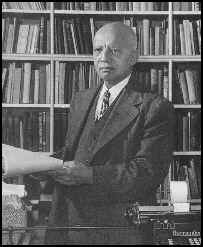By HarlemGuy
 The origins of Black History Month began when Carter G. Woodson founded the Association for the Study of Negro Life and History in 1915 and one year later, the Journal of Negro History.
The origins of Black History Month began when Carter G. Woodson founded the Association for the Study of Negro Life and History in 1915 and one year later, the Journal of Negro History.
Woodson was a Harvard-trained historian. He believed that publishing scientific history about the black race would produce facts that would prove to the world that Africa and its people had played a crucial role in the development of civilization. That Scientific history, he believed, would counter racial falsehoods. That reason would prevail over prejudice truth would trickle down to the public, and the race problem would gradually disappear.
In the 1920s Woodson began urging black civic organizations to promote the achievements that researchers were uncovering. In 1924 he created the Negro History and Literature Week with help of his fraternity brothers at Omega Psi Phi to take up the work. This later renamed Negro Achievement Week.
Woodson selected the week of February that encompassed the birthdays of both Abraham Lincoln and Frederick Douglass. Lincoln had issued the Emancipation Proclamation that moved the nation away from slavery. Frederick Douglass had been a great leader of African Americans. In selecting February, Woodson’s sought to promote his belief that African Americans history was American history.
By 1925 the Association broadened its focus to include whites and black and anyone interested in history, not just historians and other scholars.
In the years that followed Black history clubs sprang up. Demand for materials from teachers soared. In response the Association published photographs and portraits of important black people. It published plays to dramatize black history. It also formed branches to bring people into the organization.
Woodson died in 1950. By that time Negro History Week had become a central part of African American life. In cities across the country, mayors issued proclamations noting Negro History Week.
In the 1960s African Americans entered into mainstream colleges and in the tradition of the Freedom Schools established during the civil rights era which included the study of Black history, they demanded that Black Studies and Black history became a central feature. Increasingly there were cries for more than a week to study Black history.
In 1976, fifty yearsafter the first celebration, the Association held the first Black History Month. Since then all American presidents, Republicans and Democrats alike, haveissued Black History Month proclamations.
Check the sites below for more educational information and upcoming events.
More to do in harlem this month~!
http://harlemworldblog.wordpress.com/2009/02/05/black-history-month-hue-man/